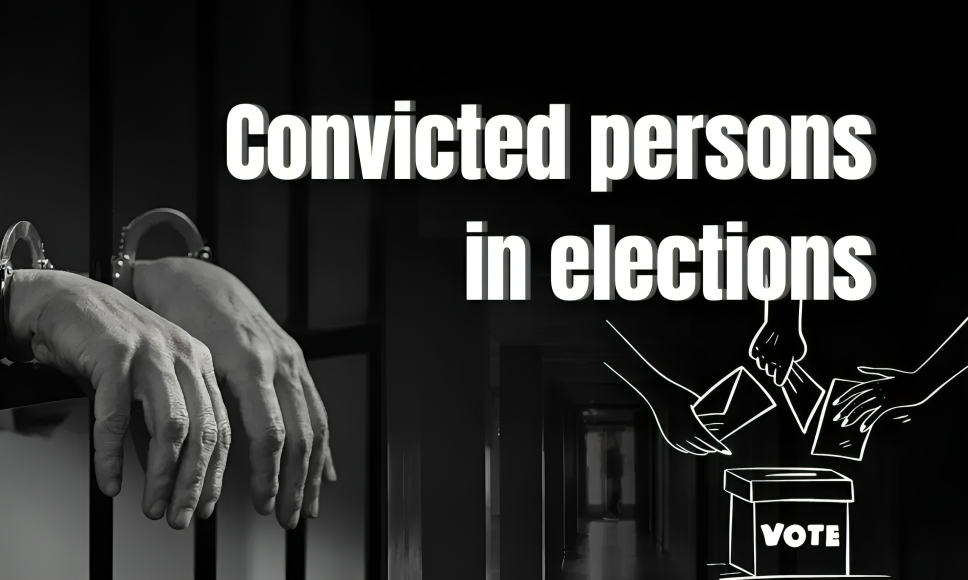Should convicted persons contest elections?


News:
Recently, the Supreme Court of India revisited the debate on banning convicted individuals from contesting elections. The court questioned the logic behind the six-year disqualification period post-conviction and sought responses from the Centre and Election Commission on imposing a lifetime ban on such politicians.
Arguments in Favor of a Lifetime Ban on Convicted Persons Contesting Elections
- Ensuring Integrity in Public Office
Barring convicted criminals from contesting elections permanently upholds the sanctity of legislative bodies and ensures lawmakers maintain high ethical standards.- Example: In 2013, the Supreme Court (Lily Thomas v. Union of India) ruled that convicted MPs/MLAs would be disqualified immediately, emphasizing political integrity.
- Consistency with Employment Rules
Government job applicants with criminal records are often disqualified permanently. If such individuals cannot hold a junior-grade government position, allowing them to make laws is illogical.- Example: The UPSC and state public service commissions bar candidates with serious criminal convictions from government jobs.
- Curbing Criminalization of Politics
A 2024 report by ADR found that 31% of elected MPs have serious criminal charges, including murder and rape. A lifetime ban can deter criminals from entering politics, reducing corruption and lawlessness.- Example: Bihar’s former MP Mohammad Shahabuddin, convicted of multiple murders, continued influencing politics until his death, exploiting legal loopholes.
- Public Trust in Democratic Institutions
Elected representatives with criminal backgrounds erode public confidence in democracy. A lifetime ban assures citizens that governance is in the hands of ethical leaders.- Example: In 2018 (Public Interest Foundation v. Union of India), the Supreme Court emphasized the need to decriminalize politics to preserve public trust.
- International Precedents Support Stricter Rules
Many democracies impose strict eligibility criteria for public office. Countries like the USA and Canada permanently disqualify individuals convicted of serious crimes.- Example: In Canada, under the Canada Elections Act, individuals convicted of serious crimes cannot hold public office.
- Strengthening Voter Choice by Eliminating Coerced Elections
A lifetime ban on convicted politicians prevents criminal elements from coercing voters through intimidation, muscle power, and money politics.In 2019, UP’s Kunda constituency, Raghuraj Pratap Singh (Raja Bhaiya), a politician with multiple serious cases, allegedly used strong-arm tactics to secure votes, leaving voters with no real alternative.
Arguments Against a Lifetime Ban on Convicted Persons Contesting Elections
- Violation of Democratic Rights
A lifetime ban denies reformed individuals a second chance, contradicting democratic principles. Rehabilitation is a key tenet of justice, and permanent exclusion ignores their right to redemption.- Example: Nelson Mandela, once convicted for anti-apartheid activities, later became South Africa’s president, proving potential for reform.
- Potential for Political Misuse
A blanket ban could be misused to eliminate political opponents by falsely implicating them in criminal cases. Given India’s history of politically motivated cases, such a rule could be weaponized.- Example: In 2019, Karnataka MLA D.K. Shivakumar faced multiple ED and CBI investigations, raising concerns about political vendettas.
- Distinction Between Serious and Minor Crimes
Not all convictions reflect moral turpitude. A person convicted for defamation or political activism should not be treated the same as someone convicted for murder or corruption.- Example: Arvind Kejriwal faced multiple defamation cases before becoming Delhi’s Chief Minister, highlighting how minor convictions can be politically motivated.
- Contradiction with Existing Legal Framework
Current laws disqualify convicted individuals only for six years post-release, ensuring a balance between punishment and rehabilitation. A lifetime ban could be excessive and legally contentious.- Example: In 2020, the Central Government defended the existing six-year ban before the Supreme Court, stating that MPs and MLAs are not bound by government service conditions.
- Judicial Delays and Wrongful Convictions
India’s judicial system has a high backlog of cases, and wrongful convictions are not uncommon. A lifetime ban may unjustly punish those later found innocent.Example: In 2017, a Delhi court acquitted Professor G.N. Saibaba, who had been wrongly convicted under UAPA, demonstrating flaws in judicial processes.
- Disproportionate Impact on Marginalized Leaders
A lifetime ban could disproportionately affect Dalits, tribals, and activists, who often face fabricated criminal charges due to social and political bias. These leaders frequently challenge powerful groups and are wrongfully implicated in cases to silence them.- Example: Chandrashekhar Azad (Bhim Army Chief) was booked under the NSA in 2019 for Dalit rights activism, demonstrating how legal provisions can be misused against marginalized politicians.
Conclusion:
The debate over a lifetime ban on convicted politicians presents compelling arguments on both sides. While proponents argue that such a ban would strengthen democracy by eliminating criminal influence, ensuring fair elections, and upholding the integrity of public office, opponents highlight concerns about the potential misuse of laws, disproportionate impact on marginalized leaders, and the erosion of rehabilitation principles in a democratic system.